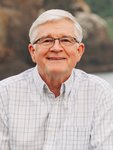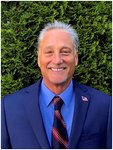



Two Republicans are looking to unseat the Democrat Dean Takko in the 19th Legislative District state Senator race in the August primary election.
Takko, of Longview, is challenged by Jeff Wilson, of Longview, and Wes Cormier, of Elma, to secure another four-year term as a state senator.
For Wilson and Cormier, a win would mean their first positions as a state legislator.
The primary election is scheduled for August 4 and ballots will be mailed out on July 15. Voters have until July 27 to update their information or register to vote online, or they have until 8 p.m. on the day of the election to do it in person.
Jeff Wilson (Republican)
A resident of Longview for 50 years and a graduate of Mark Morris High School and Western Washington University, Wilson says he wants to limit taxes, safely bring Washington workers back to their jobs amid the COVID-19 pandemic and have more transparency in government at the state level if he is elected as the state senator of Legislative District 19.
Wilson said he learned the ins and outs of the local economy through years working in the private sector running and founding businesses, and said he understands the needs of business owners, making him the ideal candidate to represent them.
“I had the pleasure to conduct business in Southwest Washington for many years and that led me to engage civically and become a very engaged local citizen whether it was through activism or taking on community projects,” Wilson said.
Specifically, he opposes the idea of an income tax in Washington and any additional business and gains taxation.
“You can’t kid a kidder,” Wilson said. “I understand most of the angles of our local economy.”
In 2016, Wilson won his first elected position as a Port of Longview commissioner for District 1. Wilson said — as it pertains to limiting taxes — much of what he accomplished as a port commissioner is what he intends to do as a state legislator.
But more pressing to Wilson currently is the COVID-19 crisis.
“If anybody started out this year with a set-in-stone platform (to run on), I won’t buy it,” Wilson said. “Even my platform has been open-minded because we were dealt things that we’ve never seen with COVID.”
Though the COVID-19 pandemic is continuing to evolve, Wilson said his priority is to mitigate the losses from the crisis and get the local economy back on track through a fiscally conservative approach.
Wilson also said that, if elected, he would work to see an end to title-only bills, or “ghost bills,” as he sees it as an attempt by legislators to rush bills through the legislation process while keeping it under the radar from the public.
“(Ghost bills) are the form of skullduggery that help create the mistrust in government,” Wilson said.
For more information on Wilson, visit: jeffwilsonforsenate.com
Wes Cormier (Republican)
Cormier, who is a product of a military family and has been a resident of Grays Harbor County since his parents were stationed in Bremerton when he was a child, says he has three foundational issues he is running on: Fiscal responsibility, property rights and transparency in government.
Cormier began his career as a real estate appraiser, but after seven years of being involved in the real estate industry, he decided to throw his hat into the political arena.
In 2012, Cormier won the Grays Harbor County commissioner seat for District 1 and was reelected in 2016. Now in his eighth year as a county commissioner, Cormier said he isn’t seeking reelection for his commissioner seat on account of his belief in term limits.
Cormier said as a county commissioner he became particularly familiar with the three issues he is running on and feels he can use those experiences to fight for more transparency, more fiscal responsibility and better property rights at the state level.
“I think at the state level, oftentimes, state officials don’t think about where the rubber meets the road,” Cormier said. “And that’s done usually at the city and county level … I think just my knowledge at the county level gives me a good perspective at the state level.”
In terms of government transparency, Cormier said he was pleased with Washington’s Supreme Court ruling in December 2019 that found state legislators are subject to public records law, but said there is more to be done.
He says his track record of advocating for open public union negotiations at the county level and establishing a media Q&A after commissioner meetings to provide more transparency between elected officials and the public are evidence that he will continue that fight in Olympia if he is elected.
As an advocate of property rights, Cormier said he has written and passed policies at the county level that have resulted in fewer fees and restrictions, provided relief for those affected by floods in 2015 and lobbies for access to public lands.
For more information on Cormier, visit: voteforwes.com
Dean Takko (Democrat)
After nearly 30 years spent working in assessor’s offices — in some elected positions and some not — from 1975 to 2004 in Wahkiakum County and Cowlitz County, Takko began serving as a state legislator in 2005.
Once appointed as state Representative No. 1 for District 19 in 2005, Takko was reelected every year — running unopposed once in 2008 — until 2015 when he was appointed to the state Senate and then was reelected in 2016.
As the incumbent, Takko seeks another term as District 19’s state Senator and says he is doing it the way he always has: by keeping his ears open to both Democrats and Republicans and advocating for the various industries in District 19.
“If you’re not up in Olympia you may not see it, but I work well with Democrats and Republicans,” Takko said.
He added: “The frustrating part about being Olympia is there are far too many people that are way out on the left and the right of issues, and you don’t get anything done there,” Takko said. “It’s out in the middle where you get things accomplished so I try and bring people there.”
Takko reasoned that part of the reason why he has been able to maintain his support in District 19 is from the support of local industries.
Takko says he is cognizant that different parts of the district have different needs based on what drives the economy — like in Longview where the economy is more industrial with paper mills and chemical manufacturers. But once you head out to the coast, there are more resource-oriented industries like fishing and forestry, Takko said.
“That’s probably one of the reasons I’ve had a lot of support from those industries because I really try to go to bat for them,” Takko said. “Some people say we need to get the jobs for the new millennium, or whatever, but those resource-oriented jobs are still the backbone of this district.”
For more information on Takko, visit: deantakko.com